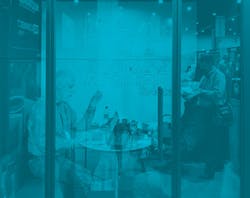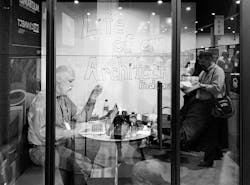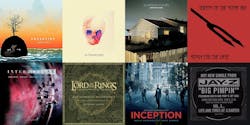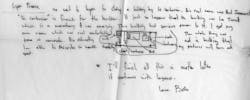Ask the Show
What music do you listen to? What’s your design process? What is your favorite building and why? What do you eat for breakfast? All this and more as Andrew and I answer your burning questions where almost nothing is off-limits.\
@b_laurin – Early architecture careers, making the transition from intern to a licensed architect [2:21 mark]
Is there a transition? I’m not sure that there is.
@fatemehkzm – To do “Pro Bono” projects or not to do? Especially early on in your career. [5:10 mark]
You should always take on some sort of Pro Bono work in your life. It’s good for other people, it’s good for the community, and it will make you feel like a good person. We all have time we can spare – give something back.
ANDREW: This is always a “yes” – I try to make certain I do some every year. Just always remember – Pro Bono does not mean free work for those who can pay. Pro Bono is work with meaning that is provided free of charge by your choice.
@nicole_elsholz – Music you and Andrew listen to while designing/drafting w/ updates every few episodes [8:30 mark]
I was going to start off by saying how important music is to me, but that seems like something everyone would say so I’m not sure it has any real value. I will say that I listen to a lot of music while I work – so much that it seems like I kinda get bored with everything eventually. I tend to put together running playlists rather than themed playlists. Every time I find a song I like, I add it to this particular playlist (it’s actually titled “Torture Ryan” base on …) It currently has 160 songs on it and I won’t share it with anybody because there is some jenky embarrassing stuff on there.
So, in order to answer this question, I went into my music history and what I came up with is a complete hodgepodge of randomness. I listen to a lot of music and I need to confess two things: First off, I musically know a lot of stuff – but most of it came out between the decades of 1920 and 2000. I don’t know as much modern music but I think I still do alright. Secondly, I don’t know the words to any songs – not 1 single song. I might not even get Happy Birthday correct.
So according to my listening history, here are my current 4 most favorite bands:
Silversun Pickups – I love them, all of their albums
Queens of the Stone Age – How to Handle a Rope, Songs for the Deaf, Rated R, Villains
All Them Witches – “Heavy like a Witch” was the song that caught my attention, Charles William is another awesome song
Passafire – reggae band out of Georgia (I think) although the lead singer Ted Browne moved last year to Maryland … a hotbed for reggae music! Submersible is a good starter album, Longshot is another
ANDREW: I prefer to listen to music that does not have any actual words. I like to work to instrumentals or soundtracks. If there are words I find that it becomes distracting to me due to my inclination to sing along or listen to words in lieu of actually working … just how my brain seems to work. As Bob stated, I have a plethora of song lyrics stored securely in my head that cannot help but bubble to the surface when a song comes on, so I mentally have to steer clear. I will say I like to have some variety in the tempo and such so it’s not like elevator music. I often choose movie soundtracks, jazz, classical and the occasional video game score. Many of these I find via YouTube and they are 5 to 10 hour long playlists or tracks that I just start at the beginning of my workday and they’ll last all day.
Some of my favorites are soundtracks/scores are from the movies: Inception, Interstellar, Lord of the Rings Trilogy, and Game of Thrones, along with music from the Skyrim video game.
Jazz is a bit more complicated but listening to Miles Davis or John Coltrane is always great but I will also mix in some “lounge” or “coffee shop” jazz compilations.
Many may think that I tend to opt for sounds that are a bit more brooding. I may agree. But for some reason, I am drawn to melodramatic sounds to get my motivations stirred and keep me going through the day. I will say that while I do all of my driving for work, the music is definitely a different vibe. There it becomes more like road trippin’ tunes or even dare I say … podcasts!
@benham_design – Design talk, your process of design. How deep do you go into the details? Your philosophy stuff. [15:06 mark]
I’m not sure that I am aware enough of my design philosophy to be able to articulate it succinctly. I will say that the nature of how my career and knowledge base has evolved that I think that how something gets built should be reflected in how it is designed. I am incapable of designing now without thinking of all the parts and how they come back together.
At times I think this is a little limiting to the creative process. When I do desk critiques now, how something gets built ALWAYS becomes part of the conversation but it also suggests that I have a certain level of mastery and understanding of how everything is built – which I clearly don’t.
ANDREW: For me, this is something that is becoming more clear as I have to explain my thoughts to students almost every day. In addition, I have begun to boil my thoughts down into some semblance of a philosophy, or at least a set of ideals, and those all start with the notion of “Section as Design”. Look for the soon to be released docudrama of the same title. (jokes) But my ideas all stem from this concept of how I design.
@akashsharmar3 – How to get better at basic design in architecture [25:20 mark]
Would you be surprised to learn that I get asked some variation of this question literally every day on the website? I will be interested to hear what you have to say as an architecture school professor but I can tell you my undoubtedly poor response. First, you need to have an organizing idea – something that will help shape your direction and guide you when making decisions. This is what we used to call a parti diagram when I was in school. Can I actually take a moment and define what a parti diagram is? – it’s lingo and I typically try and avoid these sorts of words. A parti diagram is a drawing or diagram used early on in the design process to represent your design concept. Think of it as the classic napkin sketch – you are struck with an idea and you just need to articulate it’s essence before the vision leaves.
When you make a design decision and you ask yourself – Does this support my big idea or is this just decoration? I think we can acknowledge that few of us are Adolf Loos and we like a little bit of ornament and decoration in our designs – we are talking about basic design here. After the guiding idea, I like to advocate the creation of the form, scale massing and proportion. Where the answer to this question falls apart is trying to then describe how to get better at form, scale, massing, and proportion. That’s architecture school!!
ANDREW: As a newly anointed professor, this is something that I am constantly thinking about these days. How do you explain basic design to someone and how do you make it happen? Through this practice, I have come to the conclusion that it is almost like any other endeavor you want to master in that it takes practice. Lots and lots of practice.
@wal.quin – What is your favorite building and why? [32:00 mark]
I honestly hate this question – which is pretty irrational for an architect. Surely there is some building that speaks to me in a consistent and on-going nature? Right? Wrong! For me, it is all about the experiences I associate with that building. While there might be a purely academic appreciation for a certain building, A) I think it should be a requirement that you’ve actually been to your “favorite” building, and B) that it had an impact on you – because if it didn’t why would it be your favorite building?
ANDREW: I definitely think you cannot have a favorite building that you have never experienced in person. That is the point of all architecture…to experience it. So my choice was visited early in my architectural education and it had a strong impact on my thoughts about light, space and technology. And luckily for me, it is close to home.
@fortyone . NZ and @jpna88 – Metric or imperial … be honest. [34:18 mark]
Easy. But Andrew and I have not talked about our answers to these questions yet – right? On the count of three, as in 1, 2, 3, answer!
… you have got to know what our answer is going to be, right?!?
@trevthomas_ – Looking back on school (I know it’s been a while) what would you do differently? [35:37 mark]
Depending on how I answer this question, the answer is either long or short … so I’m going to go short. I am also going to assume that since we are looking back we have the benefit of hindsight. The easy answer is that I would tell myself to pay more attention to my history and theory classes, probably take some business type courses, maybe burn a few more electives that would develop my drawings skills. Actually, maybe I should just focus on that last bit.
ANDREW: This one was easy for me. Work harder. Not that I didn’t work hard while I was in school, but looking back I know I could have done more and applied myself better. It’s not about just making the grade, but pushing myself to my own limits and not just what the course “required”. This is something I currently attempt to instill in my students.
@igloreous – Favorite contemporary architect *that’s not a starchitect [37:50 mark]
The emphasis here has to be on the “not a starchitect” portion of that question, right? I also think that we could probably turn this into a full-blown podcast episode, starting first and foremost with defining what constitutes a starchitect. Okay – favorite contemporary architect that is not a starchitect. This suggests to me that that pool I should be drawing from are regular practitioners, not the cast of usual people.
Can I add that now that I’ve made the transition to an architectural firm that focuses on commercial work, that my list of starchitects would be wildly different than just about everybody in my new office? We have the Gehry’s, Zaha Hadid, Norman Foster’s that transcend the silo of work that they focus on, but most of my starchitect’s come from the residential side of the industry – at least until I become more familiar with the work of commercial architects.
Pitsou Kedem Rand Elliot Architects Cuppett Architects
Salmela Architect Omar Gandhi Dust
Laney LA Alter Studio Marlon Blackwell Architects
Stuart Sampley Architect
ANDREW: I really think this was a fantastic question because of the real question it brings up … how do you define “starchitect?” I am hoping to maybe get this into a full episode in the 2020 schedule as I find it a rather fascinating exercise to discuss this definition. As for me, I feel like most of my selections from the above list are those that I have had some level of contact and interaction with about their work. Hearing someone speak about their architecture and ideas on design almost always makes me like them more!
@ec.xv – What do you eat for breakfast and at the office during a typical work week? [44:36 mark]
This is a hilarious question – pretty random but since we are regular people I thought we should answer it just to make sure everyone knows that I am just like them. For me, every morning I have my butler prepare a sautéed spinach omelet using 1.7 egg whites with fresh-squeezed orange juice served without ice but at precisely 57 degrees.
In reality, I eat like garbage and at my age, I should know better. My current routine, when I am making an effort, is a bowl of cereal (Honey Bunches of Oats – which sounds healthy enough) and I’ve started making an iced cold-brewed coffee for the drive-in. If I could eat what I want, which I still do from time to time, is I will stop by a local taco joint and get a few breakfast tacos.
ANDREW: I don’t really eat breakfast before a typical workday, but on the weekends certainly! However, for me and working within the time I have, my breakfast tends to be off the schedule. Therefore, my morning intake is caffeinated liquids. Just like Bob, I don’t eat like I should for a grown man who knows better. Insert sad face here!
The best advice is pretty easy – I have two –
Do What You say you are going to do when you said you were going to do it. I have elaborated on this piece of advice here on the site, back on March 15th, 2011 in this post: The Best Advice I Ever Received … I think the title of the post says it all but it really is true and this is life-changing advice for anyone in any profession.
I did have another piece that I received that was particularly helpful – although it was probably the most difficult message I have professionally ever had to listen to. I mention in today’s episode but you can read it for yourself here: Eat Your Vegetables.
ANDREW: It is not always easy to determine advice. I tend to maybe just recall examples of ways to act as a sort of advice. So for me, the easiest one to appreciate is all about keeping your calm.
Hypothetical [54:34 mark] Today’s question, courtesy of @cullen_d_smith:
"If you could have your dream home, but there was a murder in it, would you live there?"
It’s a scary question – maybe (is it really?). You know that I have a wrinkle to throw in there but I’m not going to tell Andrew what it is until it’s inconvenient for him. This question really comes down to two things … do you believe in ghosts or specters (the evil version of a ghost), and whether or not you are comfortable compartmentalizing something negative occurring in your personal space. While I wasn’t surprised by Andrew’s answers, I was more than surprised at the crazy scenarios I had to come up with in order to get him to change his answer.
So there you go – eleven burning hot questions submitted by listeners finally answered. We have roughly another 10-15 that we have earmarked for another “Ask the Show” episode but if you have a question, and would like a shout-out on the show, please send it along … this also includes hypotheticals for what it’s worth. I’ll keep track of them and if you want, you can even include the link to where you would like your shout-out to point. Website, Instagram, LinkedIn account … wherever you want (as long as it isn’t completely weird or deviant).
We would like to thank AISC for supporting today’s episode. The Forge Prize recognizes innovation in the use of structural steel and how it can be used to reduce design and construction time. The Forge Prize, established by the American Institute of Steel Construction, invites emerging architects to submit proposals for visionary designs that embrace steel as the primary structural component to increase project speed. To enter, go to forgeprize.com for all information about the prize, rules and regulations and to get started on your entry.








